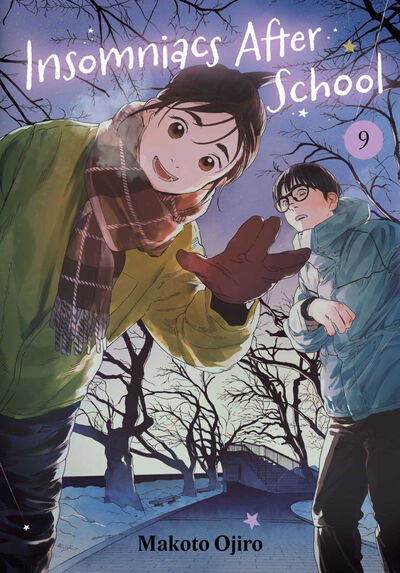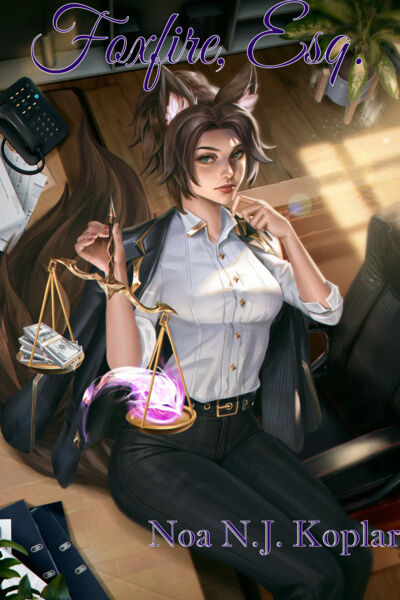Insomniacs After School, volume 9 by Makoto Ojiro
Apr. 23rd, 2025 08:54 am
In which the weather does not conspire against Ganta and Isaki, although other things do.
Insomniacs After School, volume 9 by Makoto Ojiro



After twenty-five or so books, you would think I’d have this whole novel-writing process down solid. Have a viable strategy, be organized, go about the development of constructing characters and plot in a somewhat coherent manner.
Ha! (she laughs bitterly)
Every book is its own process. Sometimes I’m lucky enough to have a series that uses the same methodology for each book, but that isn’t always the case.
That happened with my first two series, the Netwalk Sequence and Goddess’s Honor. Granted, they were early works, but as I progressed through both series, I ended up changing things around. What became key for both of those series was a very detailed scene matrix where I literally identified where every major character was in each scene and what their motives were within that scene. I did the basic outline by hand before writing, then went back and analyzed each scene as part of my revisions.
I had several reasons for organizing myself in that manner. First, as it turned out, I was alternating writing books in both series so that I had two books coming out a year, one book in one series, the other in the other one. Second, I had multiple character viewpoints, so I wanted to ensure that the voices in the book were balanced. Third, those characters were scattered across the continent (and across the ocean) in Goddess’s Honor, while characters were on Earth/the Moon/space stations in the Netwalk Sequence. Fourth, we were in the process of a long distance move to a second home.
Well, lessons learned.
First, I vowed that I was NOT going to have four POVs in future work because it just got too complicated and, I fear, weakened the impact of the story, though—looking back, those multiple POVs were necessary. At least for those particular story arcs.
Second, I decided that I was not going to switch between series, but would write a series all at once, then release the volumes close together. I cheated a little bit doing this with the assorted Martiniere sub-series because I also ended up writing a couple of unrelated books as well as a couple of novellas during that time. But—Kindle Vella had just started up and I had appropriate ideas that would be good for that market. An allowable reason.
Writing a series all at once helped me deal with problems in book continuity within a series, though those darn characters kept twisting things between the beginning of the first book and the last part of the last book (glaring at The Cost of Power, which really tried my patience with last-minute discoveries, such as the linkage between the Martinieres and the Carolingian Mythos. When Durendal appears in the last third of the third volume of Power, Redemption, I wanted to scream. Then I took a deep breath and revised everything).
I also came up with a new strategy involving Scrivener and Word which dealt with some of the travel issues. Years ago, I wrote in WordPerfect and took advantage of its master document formatting setup, which allowed me to draft chapters as separate files, then link them so that I could call them up in one big document. My Word drafting was all one document which…got annoying when I needed to refer back to earlier sections for continuity’s sake.
I was already starting to consolidate my research notes and my character notes in Scrivener. Then it dawned on me—why not draft a chapter in Word, then paste it into Scrivener? I already was keeping Scriv open to access my outline and character notes. Putting the book into Scriv chapter-by-chapter allowed me to a.) appropriately version the story, and b.) made drafting continuity a lot easier.
Solved that problem, but—then it became an issue of story organizing.
I am sometimes a hard-core plotter, and sometimes…not. For the last batch of books, I started writing chapter-by-chapter synopses. As continuity tweaked things, I’d edit the chapter synopses in Scriv with dates and notes in bold. Well, it worked—for those books.
Then I started drafting the current work-in-progress, Vision of Alliance, the first book of Goddess’s Vision. This series, a sequel series to Goddess’s Honor in what I’m now calling the world of the Seven Crowned Gods, has been my bane for over five years now. I started working on the Martinieres to avoid it because while I knew I wanted to write what happens next, I just couldn’t find the opening. Shades of the first series, because it took me years to find the opening for Pledges of Honor, the original first book of Goddess’s Honor (the official first book, Beyond Honor and Other Stories, is made up of stories I wrote later).
When I finished The Cost of Power trilogy, I flailed around trying to poke at other ideas. Nope. None of them wanted to do anything. It was time to start work on Goddess’s Vision. The Martinieres were done unless I wanted to write the next generation and…I couldn’t do that, either.
Very well. Goddess’s Vision it was. But I couldn’t come up with ideas for more than one book. Well, I figured it would come. Time to start writing.
I got to about the fourth chapter, then had to take time off for business stuff. When I came back to the story, I read what I had written and…dear God, it was packed full of telling. I was skipping over far too much in the story and…I made myself go back and rewrite. Drafted several chapters and---oopsie, guess what. Glossed over story stuff once again. So now I’m juggling several chapters-to-be-written as well as revising already-written chapters to reflect the breaking out of important scenes.
At least I’m at the experience level where I recognized a developing problem before I got too far along.
All of this is new ground for me, because the only other time I had to tear apart a draft like this was with the first Netwalk book. And that came about because an editor saw problems in a second draft. Again, darn good thing I saw the problem developing before I got too much further along.
At this point, though, I’m definitely not worried about having enough material for a trilogy. I even know what the resolution is going to look like. It’s just…getting there.
Each book has its own process, and am I ever being reminded of that.
#
Hey, everyone! Just a reminder that your humble writer here appreciates comments, book purchases (one of these days I'll figure out Linktree and have a single place you can go to find all of my work besides Amazon and Smashwords), or Ko-fi donations.

Hoping the photo works...
This is me (in the black hat), my daughter, and my granddaughter, spending a day in the year 1642.
Lindsey has set herself up in the village of Little Woodham as a leather worker, and hopes to learn smithing before long (there are historical records of female blacksmiths in this period).
Oswin, is the leather worker's apprentice, but also showing children how to play games like 'cup and ball'.
I'm currently learning how to card wool, use a spinning wheel (I think I prefer the drop spindle at present) and talking to people about period clothing.
All in all, a very enjoyable day.


Which 1994 Clarke Award Finalists Have You Read?
Vurt by Jeff Noon
10 (16.7%)
A Million Open Doors by John Barnes
17 (28.3%)
Ammonite by Nicola Griffith
29 (48.3%)
Snow Crash by Neal Stephenson
49 (81.7%)
The Broken God by David Zindell
6 (10.0%)
The Iron Dragon's Daughter by Michael Swanwick
29 (48.3%)
 Narrated by Catherine Ho
Narrated by Catherine Ho Narrated by Rupert Degas
Narrated by Rupert Degas
I avoided this book for years, knowing that it was the first in a trilogy which the author is struggling to finish, however I really enjoyed this. The reading by Rupert Degas was terrific (excellent vocalisations) and the whole thing kept me hooked. This is a story within a story with the occasional smaller story inset. Kote is an inkeeper, or is he? When the Chronicler arrives in search of a hero's story, he gets Kote to open up, for Kote is really Kvothe, something of a legend. Kvothe himself says: 'I have stolen princesses back from sleeping barrow kings. I burned down the town of Trebon. I have spent the night with Felurian and left with both my sanity and my life. I was expelled from the university at a younger age than most people are allowed in. I tread paths by moonlight that others fear to speak of during day. I have talked to Gods, loved women, and written songs that make the minstrels weep.' But this story is about Kvothe's early life. We don't even get as far as his expulsion from the university. We see Kvothe's early life with his parents in a group of travelling players. That part of his life ends suddenly, in a massacre and young Kvothe ends up living hand to mouth on the streets of a pitiless city, eventually gaining entrance to the university where his troubles continue, but so does his absorption of knowledge and of magic. It's a good story, full of ups and downs, and barely takes us to Kvothe aged about 16 or 17. It doesn't really come to an ending, but it stops in a reasonable place and there is a second book, which, again, I'm reluctant to read because the third seems stuck in its author's head and isn't appearing on the page any time soon, if ever, which is a great pity because this is a magnificent beginning. There's an epilogue which teases that the story Chronicler has heard so far is barely the beginning and is set to hook the reader into the next book.